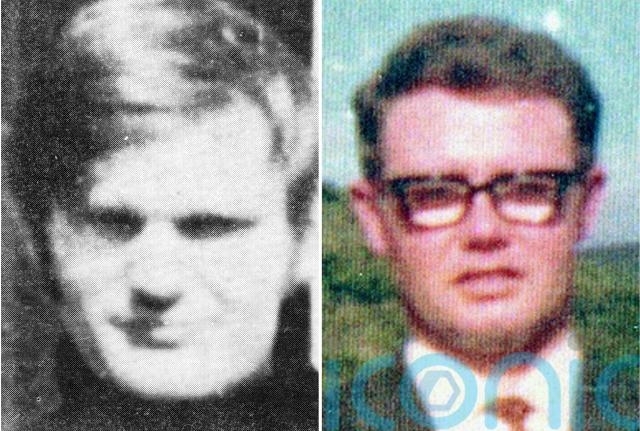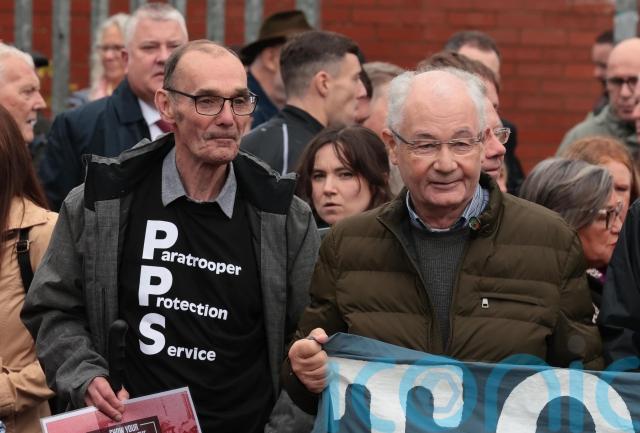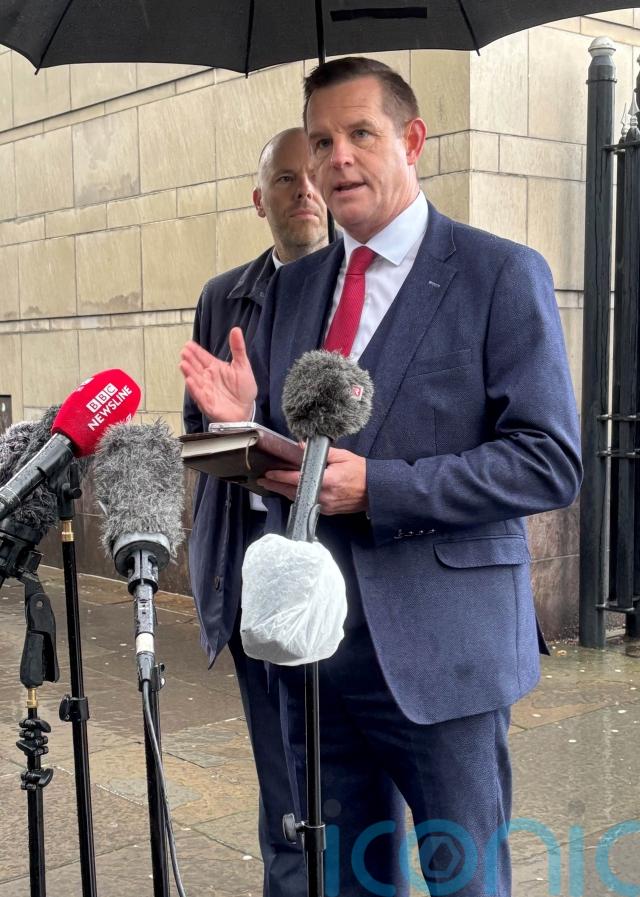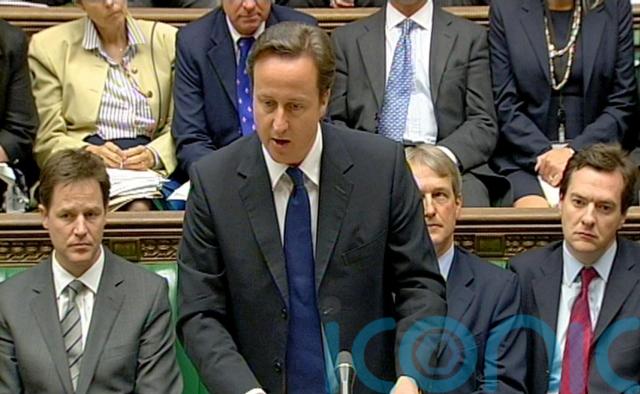
The shooting of civilians on Bloody Sunday by a former paratrooper and his platoon mates were “unjustified”, “unnecessary” and “gratuitous”, the veteran’s murder trial has heard.
Soldier F, who cannot be identified, is accused of murdering James Wray and William McKinney on January 30 1972 – the day when members of the Parachute Regiment shot dead 13 civil rights protesters on the streets of Derry.
He is also charged with five attempted murders during the incident in Derry’s Bogside area, namely of Joseph Friel, Michael Quinn, Joe Mahon, Patrick O’Donnell and a person unknown.
He has pleaded not guilty to the seven counts.

Soldier F’s long-awaited trial began at Belfast Crown Court on Monday.
The non-jury case is being heard by judge Patrick Lynch.
Before the trial began, the veteran was brought into the courtroom in the absence of the public and press and placed in a part of the dock surrounded by curtains.
A short time later, prosecution barrister Louis Mably KC commenced proceedings by setting out the Crown’s opening statement.
He said the events of Bloody Sunday had a “long-lasting and profound effect” on Northern Ireland.
He made clear the trial would have a “specific and narrow focus” on the shootings in a courtyard in Glenfada Park North.
“The defendant was part of a small group of soldiers who moved west from Rossville Street into that courtyard,” he said. “At the far end civilians, fearful of the approach of the soldiers, began running across the courtyard towards a gap at one of the corners in order to escape.
“As they did so, soldiers acting together, and therefore with joint responsibility, opened fire with their self-loading rifles shooting at the civilians as they ran away. And the result was the casualties that I’ve described: two deaths and four men wounded.

“And the prosecution case is that that shooting was unjustified. The civilians in the courtyard did not pose a threat to the soldiers and nor could the soldiers have believed that they did. The civilians were unarmed and they were simply shot as they ran away or, in one case, as he was simply in the square, either taking shelter or trying to evade the soldiers.
“The shooting was unnecessary and it was gratuitous and it was carried out, given the weapon involved, with an intent to kill and, in any event, at the least with an intent to cause really serious harm.”
Earlier, the Wray and McKinney families were joined by a large group of supporters as they walked together to the court.
The marchers carried a banner bearing the words Towards Justice.
A short rally was then held outside the court buildings.
John McKinney, a brother of William McKinney, told those gathered: “Today marks a momentous day in our battle to secure justice for our loved ones who were murdered on Bloody Sunday.
“It has taken 53 years to get to this point, and we have battled all the odds to get here.
“Everything that we have achieved to this point has been through relentless commitment and a refusal to lie down.
“We will shortly occupy a courtroom very proudly with our heads held high and in the knowledge that, regardless of the ultimate outcome, that we are on the right side of history.
“A matter of a few metres away from us in the courtroom will sit Soldier F, cowering behind a curtain, waiting to go on trial for two counts of murder and five counts of attempted murder.
“Today, we place our trust in the hands of the Public Prosecution Service to finish the job.
“We hope that they do not let us down.
“This is a prosecution brought not just on behalf of the Bloody Sunday families and the wounded, but for all the people of Derry and further afield who have stood with us.
“We sincerely thank all those who have joined with us in solidarity today, and have supported our justice campaign over the last 50 years.
“Today, our message is simple: towards justice, we shall overcome.”
Supporters of Soldier F and the wider veterans’ community also gathered outside the court.
Northern Ireland Veterans Commissioner David Johnstone said former soldiers were being subjected to “wholesale demonisation” as a result of the legacy process in Northern Ireland.

“Many veterans today feel frustrated, feel angry, and indeed feel betrayed by the legacy process since 1998,” he said.
“The legacy of Northern Ireland’s past is emotive and still very raw for many who lost loved ones during what were very turbulent and dark days in our province.”
“Legacy is indeed the unfinished business of the Belfast Agreement, and for there to be any reconciliation in this province, there must first be a fair and balanced legacy process, a process that does not facilitate the wholesale demonisation of those who served and certainly not facilitate the rewriting of the history of the Troubles.
“As Veterans Commissioner, I will continue to advocate for a legacy process that ensures fairness for all, upholds the principles of justice and recognises the service and the sacrifice of those who stood in defence of all sections of this community during one of the darkest chapters in our history.”
Bloody Sunday was one of the most notorious incidents of the Northern Ireland Troubles.
Thirteen people were killed on the day and another man shot by paratroopers died four months later.
Many consider him the 14th victim of Bloody Sunday but his death was formally attributed to an inoperable brain tumour.
Police in Northern Ireland launched a murder investigation after the landmark Saville Inquiry, which reported in 2010, found there was no justification for shooting any of those killed or wounded.
At the time of the inquiry’s publication, then-prime minister David Cameron issued a public apology, saying the killings were “unjustified and unjustifiable”.
The Saville report overturned the long-disputed findings of the 1972 Widgery Tribunal which concluded that the soldiers had been shot at first, and returned fire in self-defence.

In 2019, Northern Ireland’s Public Prosecution Service (PPS) announced that one former paratrooper, Soldier F, would face prosecution for two murders and five counts of attempted murder.
Two years later, the PPS halted the prosecution, citing concerns the case could collapse if it went to trial.
That move followed the collapse of a different legacy trial of two other veterans accused of murder during the Troubles.
The trial of Soldier A and Soldier C for the 1972 shooting of Official IRA leader Joe McCann in Belfast ended in April 2021 after a judge ruled that key evidence due to be relied on by the prosecution was inadmissible.
The evidence was statements given by the soldiers to the Royal Military Police (RMP) after the shooting.
The case against Soldier F also involves RMP statement evidence, from other soldiers who were on the ground in the Bogside during the shootings, and the outcome of the McCann case prompted the PPS to review the prosecution and ultimately discontinue it.
This was challenged in court by the family of Mr McKinney, with judges in Belfast quashing the PPS decision.
The prosecution was resumed by the PPS and it now reached crown court trial. The issue of evidence admissibility is set to be examined in the first week of proceedings.
Mr Mably mentioned the issue in his opening statement.
He said two other soldiers involved in the shootings in Glenfada Park North had given statements to the RMP later that evening.
The barrister said those statements included admissions from the soldiers that they had opened fire in the incident, and claims that Soldier F had opened fire as well.
Mr Mably said the two soldiers made “demonstrably false” claims in their statements that those who had been shot were armed and posing a threat.
He added that the significance of the statements was that they identified Soldier F as one of the people who had opened fire in Glenfada Park North.
The barrister said the statements would be the subject of a hearsay application on Wednesday to determine their admissibility as trial evidence.
The trial continues.
Subscribe or register today to discover more from DonegalLive.ie
Buy the e-paper of the Donegal Democrat, Donegal People's Press, Donegal Post and Inish Times here for instant access to Donegal's premier news titles.
Keep up with the latest news from Donegal with our daily newsletter featuring the most important stories of the day delivered to your inbox every evening at 5pm.